ACC3005: Environmental Accounting System Research Project Analysis
VerifiedAdded on 2022/10/02
|10
|2222
|308
Project
AI Summary
This research project investigates the environmental accounting system and its disclosure practices within Australian companies. The paper begins with an executive summary and table of contents, followed by an introduction outlining the significance of environmental accounting, ecological accounting, and conventional accounting. A literature review explores the evolution of environmental accounting, its various applications (financial, national income, and management accounting), and the growing importance of corporate environmental disclosures. The methodology section details the research approach, including positivist and interpretative methods, content analysis, and phenomenological approaches, with a focus on qualitative data from company reports and interviews. The paper then delves into theoretical, regulatory, sustainability, and ethical issues associated with environmental accounting, including the challenges of monetary measurement, regulatory gaps, the promotion of sustainability, and ethical considerations related to environmental responsibility. The conclusion emphasizes the importance of integrating environmental accounting into the accounting systems of Australian companies and summarizes the research findings. References to relevant literature are also provided.
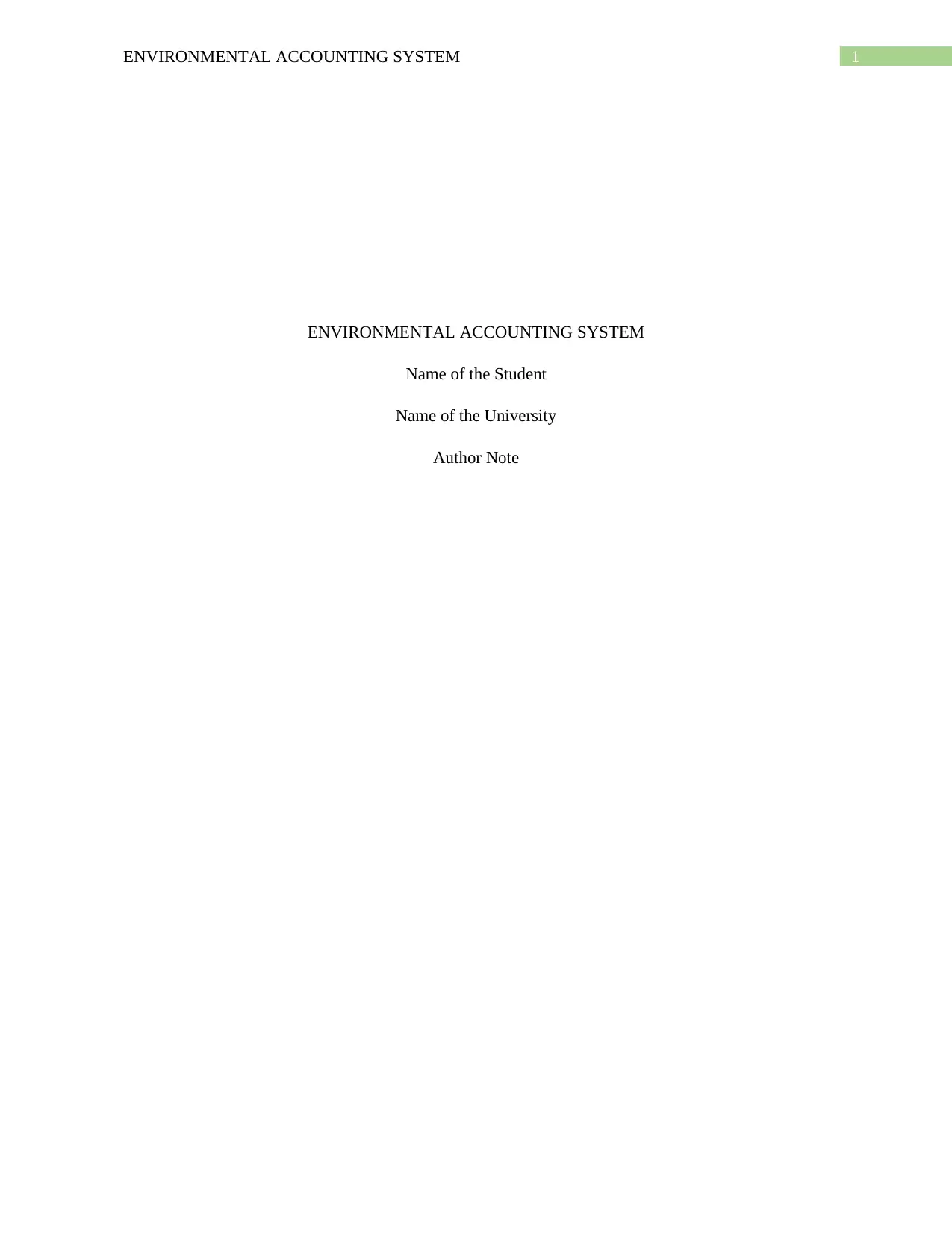
1ENVIRONMENTAL ACCOUNTING SYSTEM
ENVIRONMENTAL ACCOUNTING SYSTEM
Name of the Student
Name of the University
Author Note
ENVIRONMENTAL ACCOUNTING SYSTEM
Name of the Student
Name of the University
Author Note
Paraphrase This Document
Need a fresh take? Get an instant paraphrase of this document with our AI Paraphraser
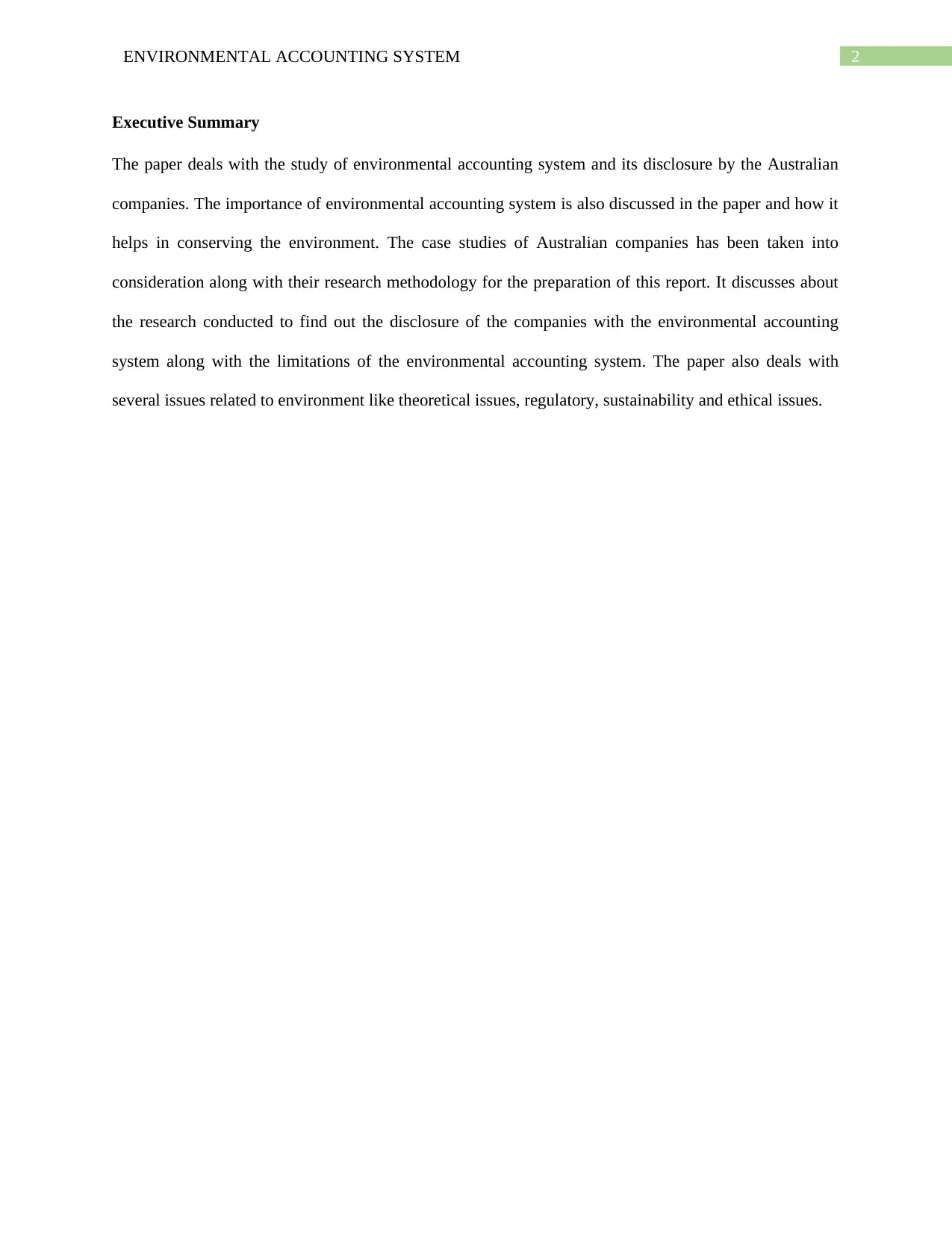
2ENVIRONMENTAL ACCOUNTING SYSTEM
Executive Summary
The paper deals with the study of environmental accounting system and its disclosure by the Australian
companies. The importance of environmental accounting system is also discussed in the paper and how it
helps in conserving the environment. The case studies of Australian companies has been taken into
consideration along with their research methodology for the preparation of this report. It discusses about
the research conducted to find out the disclosure of the companies with the environmental accounting
system along with the limitations of the environmental accounting system. The paper also deals with
several issues related to environment like theoretical issues, regulatory, sustainability and ethical issues.
Executive Summary
The paper deals with the study of environmental accounting system and its disclosure by the Australian
companies. The importance of environmental accounting system is also discussed in the paper and how it
helps in conserving the environment. The case studies of Australian companies has been taken into
consideration along with their research methodology for the preparation of this report. It discusses about
the research conducted to find out the disclosure of the companies with the environmental accounting
system along with the limitations of the environmental accounting system. The paper also deals with
several issues related to environment like theoretical issues, regulatory, sustainability and ethical issues.
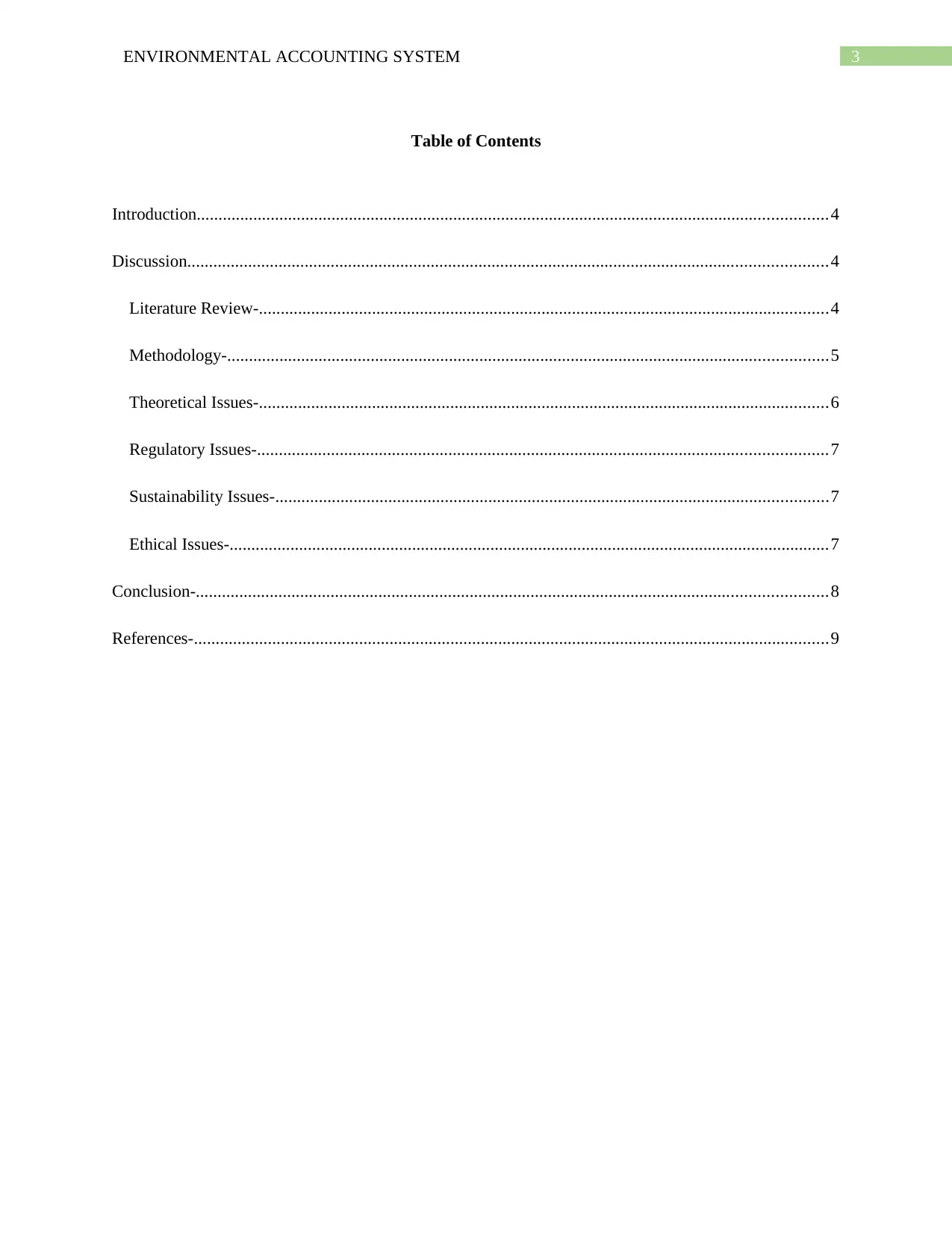
3ENVIRONMENTAL ACCOUNTING SYSTEM
Table of Contents
Introduction.................................................................................................................................................4
Discussion...................................................................................................................................................4
Literature Review-...................................................................................................................................4
Methodology-..........................................................................................................................................5
Theoretical Issues-...................................................................................................................................6
Regulatory Issues-...................................................................................................................................7
Sustainability Issues-...............................................................................................................................7
Ethical Issues-..........................................................................................................................................7
Conclusion-.................................................................................................................................................8
References-..................................................................................................................................................9
Table of Contents
Introduction.................................................................................................................................................4
Discussion...................................................................................................................................................4
Literature Review-...................................................................................................................................4
Methodology-..........................................................................................................................................5
Theoretical Issues-...................................................................................................................................6
Regulatory Issues-...................................................................................................................................7
Sustainability Issues-...............................................................................................................................7
Ethical Issues-..........................................................................................................................................7
Conclusion-.................................................................................................................................................8
References-..................................................................................................................................................9
⊘ This is a preview!⊘
Do you want full access?
Subscribe today to unlock all pages.

Trusted by 1+ million students worldwide
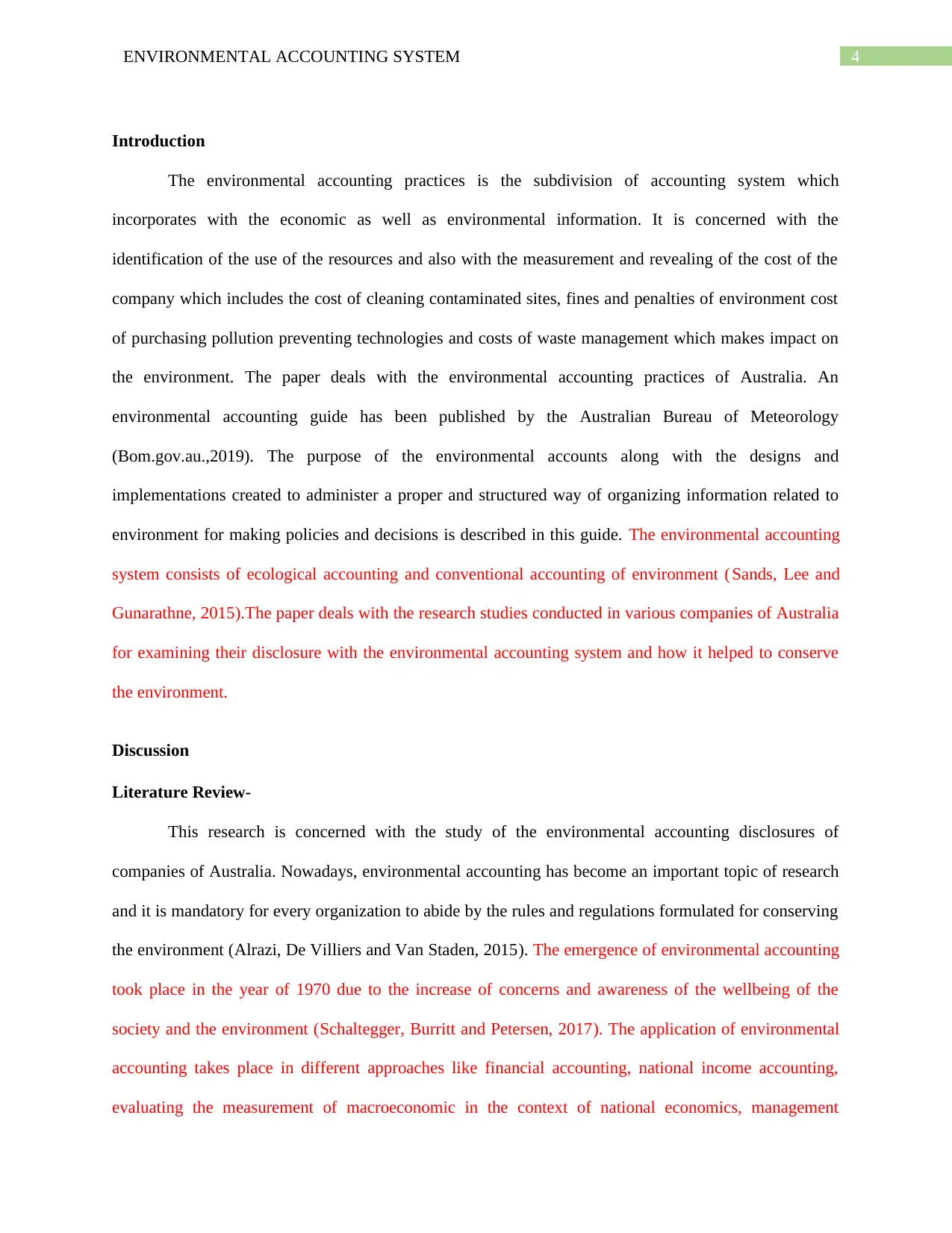
4ENVIRONMENTAL ACCOUNTING SYSTEM
Introduction
The environmental accounting practices is the subdivision of accounting system which
incorporates with the economic as well as environmental information. It is concerned with the
identification of the use of the resources and also with the measurement and revealing of the cost of the
company which includes the cost of cleaning contaminated sites, fines and penalties of environment cost
of purchasing pollution preventing technologies and costs of waste management which makes impact on
the environment. The paper deals with the environmental accounting practices of Australia. An
environmental accounting guide has been published by the Australian Bureau of Meteorology
(Bom.gov.au.,2019). The purpose of the environmental accounts along with the designs and
implementations created to administer a proper and structured way of organizing information related to
environment for making policies and decisions is described in this guide. The environmental accounting
system consists of ecological accounting and conventional accounting of environment (Sands, Lee and
Gunarathne, 2015).The paper deals with the research studies conducted in various companies of Australia
for examining their disclosure with the environmental accounting system and how it helped to conserve
the environment.
Discussion
Literature Review-
This research is concerned with the study of the environmental accounting disclosures of
companies of Australia. Nowadays, environmental accounting has become an important topic of research
and it is mandatory for every organization to abide by the rules and regulations formulated for conserving
the environment (Alrazi, De Villiers and Van Staden, 2015). The emergence of environmental accounting
took place in the year of 1970 due to the increase of concerns and awareness of the wellbeing of the
society and the environment (Schaltegger, Burritt and Petersen, 2017). The application of environmental
accounting takes place in different approaches like financial accounting, national income accounting,
evaluating the measurement of macroeconomic in the context of national economics, management
Introduction
The environmental accounting practices is the subdivision of accounting system which
incorporates with the economic as well as environmental information. It is concerned with the
identification of the use of the resources and also with the measurement and revealing of the cost of the
company which includes the cost of cleaning contaminated sites, fines and penalties of environment cost
of purchasing pollution preventing technologies and costs of waste management which makes impact on
the environment. The paper deals with the environmental accounting practices of Australia. An
environmental accounting guide has been published by the Australian Bureau of Meteorology
(Bom.gov.au.,2019). The purpose of the environmental accounts along with the designs and
implementations created to administer a proper and structured way of organizing information related to
environment for making policies and decisions is described in this guide. The environmental accounting
system consists of ecological accounting and conventional accounting of environment (Sands, Lee and
Gunarathne, 2015).The paper deals with the research studies conducted in various companies of Australia
for examining their disclosure with the environmental accounting system and how it helped to conserve
the environment.
Discussion
Literature Review-
This research is concerned with the study of the environmental accounting disclosures of
companies of Australia. Nowadays, environmental accounting has become an important topic of research
and it is mandatory for every organization to abide by the rules and regulations formulated for conserving
the environment (Alrazi, De Villiers and Van Staden, 2015). The emergence of environmental accounting
took place in the year of 1970 due to the increase of concerns and awareness of the wellbeing of the
society and the environment (Schaltegger, Burritt and Petersen, 2017). The application of environmental
accounting takes place in different approaches like financial accounting, national income accounting,
evaluating the measurement of macroeconomic in the context of national economics, management
Paraphrase This Document
Need a fresh take? Get an instant paraphrase of this document with our AI Paraphraser
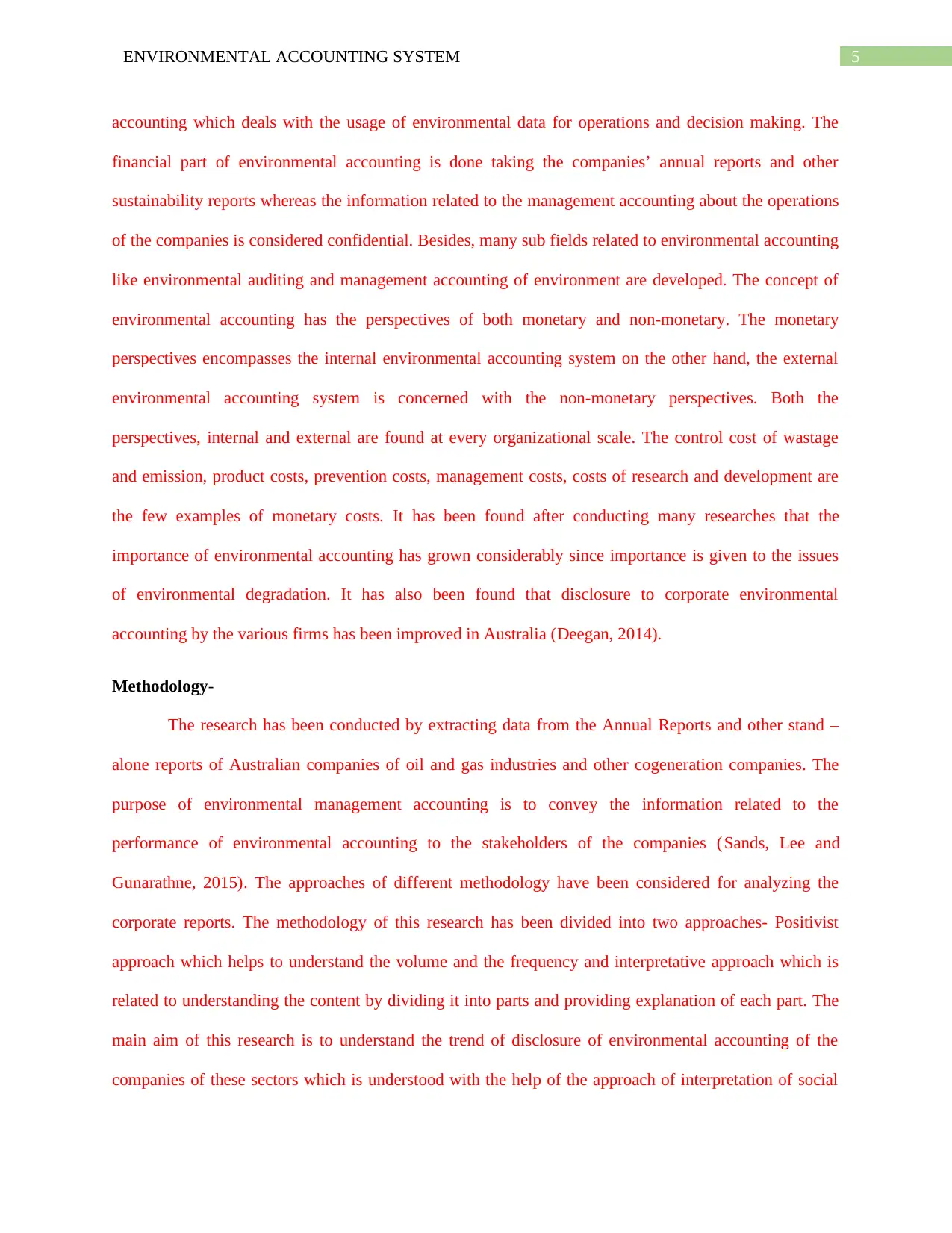
5ENVIRONMENTAL ACCOUNTING SYSTEM
accounting which deals with the usage of environmental data for operations and decision making. The
financial part of environmental accounting is done taking the companies’ annual reports and other
sustainability reports whereas the information related to the management accounting about the operations
of the companies is considered confidential. Besides, many sub fields related to environmental accounting
like environmental auditing and management accounting of environment are developed. The concept of
environmental accounting has the perspectives of both monetary and non-monetary. The monetary
perspectives encompasses the internal environmental accounting system on the other hand, the external
environmental accounting system is concerned with the non-monetary perspectives. Both the
perspectives, internal and external are found at every organizational scale. The control cost of wastage
and emission, product costs, prevention costs, management costs, costs of research and development are
the few examples of monetary costs. It has been found after conducting many researches that the
importance of environmental accounting has grown considerably since importance is given to the issues
of environmental degradation. It has also been found that disclosure to corporate environmental
accounting by the various firms has been improved in Australia (Deegan, 2014).
Methodology-
The research has been conducted by extracting data from the Annual Reports and other stand –
alone reports of Australian companies of oil and gas industries and other cogeneration companies. The
purpose of environmental management accounting is to convey the information related to the
performance of environmental accounting to the stakeholders of the companies ( Sands, Lee and
Gunarathne, 2015). The approaches of different methodology have been considered for analyzing the
corporate reports. The methodology of this research has been divided into two approaches- Positivist
approach which helps to understand the volume and the frequency and interpretative approach which is
related to understanding the content by dividing it into parts and providing explanation of each part. The
main aim of this research is to understand the trend of disclosure of environmental accounting of the
companies of these sectors which is understood with the help of the approach of interpretation of social
accounting which deals with the usage of environmental data for operations and decision making. The
financial part of environmental accounting is done taking the companies’ annual reports and other
sustainability reports whereas the information related to the management accounting about the operations
of the companies is considered confidential. Besides, many sub fields related to environmental accounting
like environmental auditing and management accounting of environment are developed. The concept of
environmental accounting has the perspectives of both monetary and non-monetary. The monetary
perspectives encompasses the internal environmental accounting system on the other hand, the external
environmental accounting system is concerned with the non-monetary perspectives. Both the
perspectives, internal and external are found at every organizational scale. The control cost of wastage
and emission, product costs, prevention costs, management costs, costs of research and development are
the few examples of monetary costs. It has been found after conducting many researches that the
importance of environmental accounting has grown considerably since importance is given to the issues
of environmental degradation. It has also been found that disclosure to corporate environmental
accounting by the various firms has been improved in Australia (Deegan, 2014).
Methodology-
The research has been conducted by extracting data from the Annual Reports and other stand –
alone reports of Australian companies of oil and gas industries and other cogeneration companies. The
purpose of environmental management accounting is to convey the information related to the
performance of environmental accounting to the stakeholders of the companies ( Sands, Lee and
Gunarathne, 2015). The approaches of different methodology have been considered for analyzing the
corporate reports. The methodology of this research has been divided into two approaches- Positivist
approach which helps to understand the volume and the frequency and interpretative approach which is
related to understanding the content by dividing it into parts and providing explanation of each part. The
main aim of this research is to understand the trend of disclosure of environmental accounting of the
companies of these sectors which is understood with the help of the approach of interpretation of social
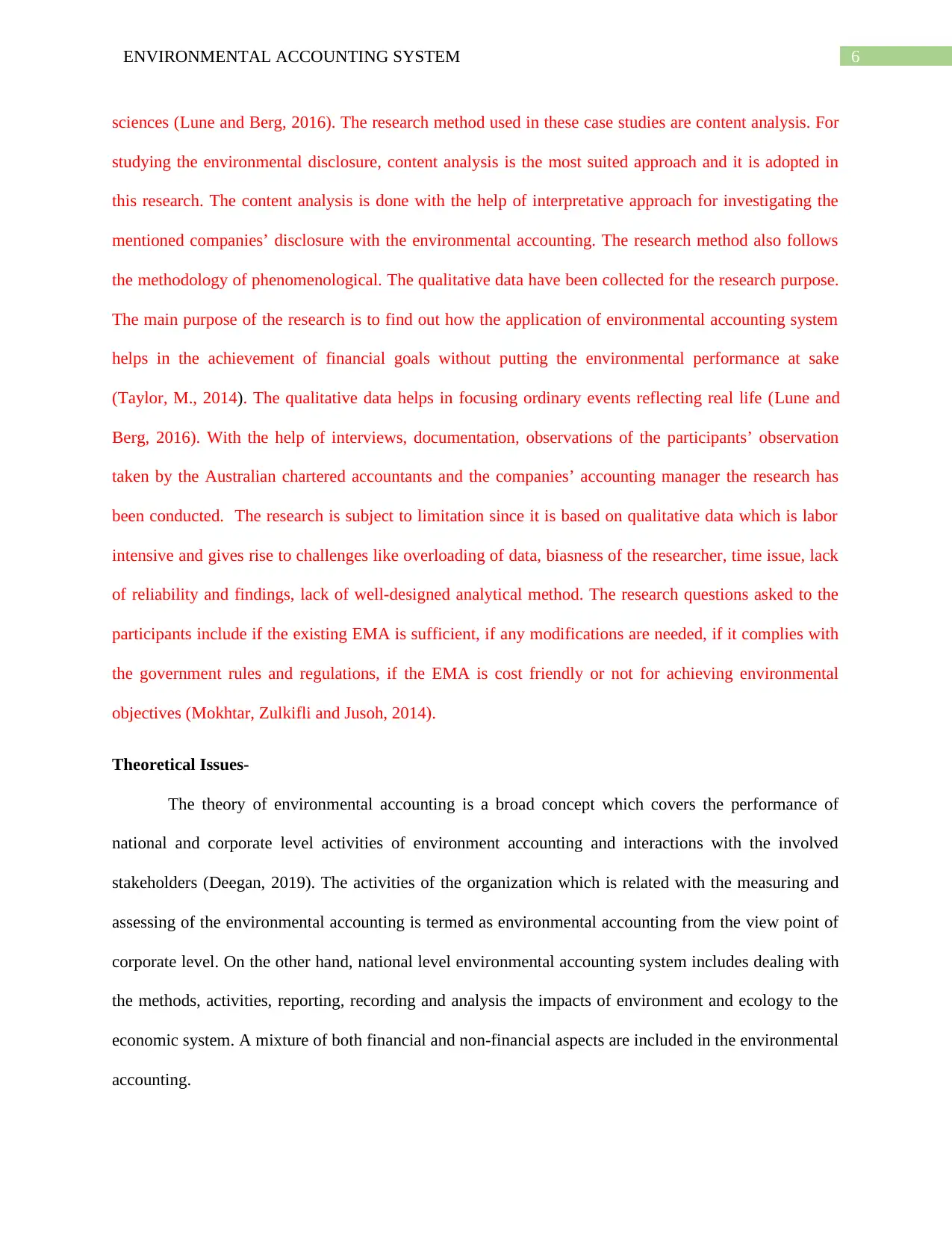
6ENVIRONMENTAL ACCOUNTING SYSTEM
sciences (Lune and Berg, 2016). The research method used in these case studies are content analysis. For
studying the environmental disclosure, content analysis is the most suited approach and it is adopted in
this research. The content analysis is done with the help of interpretative approach for investigating the
mentioned companies’ disclosure with the environmental accounting. The research method also follows
the methodology of phenomenological. The qualitative data have been collected for the research purpose.
The main purpose of the research is to find out how the application of environmental accounting system
helps in the achievement of financial goals without putting the environmental performance at sake
(Taylor, M., 2014). The qualitative data helps in focusing ordinary events reflecting real life (Lune and
Berg, 2016). With the help of interviews, documentation, observations of the participants’ observation
taken by the Australian chartered accountants and the companies’ accounting manager the research has
been conducted. The research is subject to limitation since it is based on qualitative data which is labor
intensive and gives rise to challenges like overloading of data, biasness of the researcher, time issue, lack
of reliability and findings, lack of well-designed analytical method. The research questions asked to the
participants include if the existing EMA is sufficient, if any modifications are needed, if it complies with
the government rules and regulations, if the EMA is cost friendly or not for achieving environmental
objectives (Mokhtar, Zulkifli and Jusoh, 2014).
Theoretical Issues-
The theory of environmental accounting is a broad concept which covers the performance of
national and corporate level activities of environment accounting and interactions with the involved
stakeholders (Deegan, 2019). The activities of the organization which is related with the measuring and
assessing of the environmental accounting is termed as environmental accounting from the view point of
corporate level. On the other hand, national level environmental accounting system includes dealing with
the methods, activities, reporting, recording and analysis the impacts of environment and ecology to the
economic system. A mixture of both financial and non-financial aspects are included in the environmental
accounting.
sciences (Lune and Berg, 2016). The research method used in these case studies are content analysis. For
studying the environmental disclosure, content analysis is the most suited approach and it is adopted in
this research. The content analysis is done with the help of interpretative approach for investigating the
mentioned companies’ disclosure with the environmental accounting. The research method also follows
the methodology of phenomenological. The qualitative data have been collected for the research purpose.
The main purpose of the research is to find out how the application of environmental accounting system
helps in the achievement of financial goals without putting the environmental performance at sake
(Taylor, M., 2014). The qualitative data helps in focusing ordinary events reflecting real life (Lune and
Berg, 2016). With the help of interviews, documentation, observations of the participants’ observation
taken by the Australian chartered accountants and the companies’ accounting manager the research has
been conducted. The research is subject to limitation since it is based on qualitative data which is labor
intensive and gives rise to challenges like overloading of data, biasness of the researcher, time issue, lack
of reliability and findings, lack of well-designed analytical method. The research questions asked to the
participants include if the existing EMA is sufficient, if any modifications are needed, if it complies with
the government rules and regulations, if the EMA is cost friendly or not for achieving environmental
objectives (Mokhtar, Zulkifli and Jusoh, 2014).
Theoretical Issues-
The theory of environmental accounting is a broad concept which covers the performance of
national and corporate level activities of environment accounting and interactions with the involved
stakeholders (Deegan, 2019). The activities of the organization which is related with the measuring and
assessing of the environmental accounting is termed as environmental accounting from the view point of
corporate level. On the other hand, national level environmental accounting system includes dealing with
the methods, activities, reporting, recording and analysis the impacts of environment and ecology to the
economic system. A mixture of both financial and non-financial aspects are included in the environmental
accounting.
⊘ This is a preview!⊘
Do you want full access?
Subscribe today to unlock all pages.

Trusted by 1+ million students worldwide
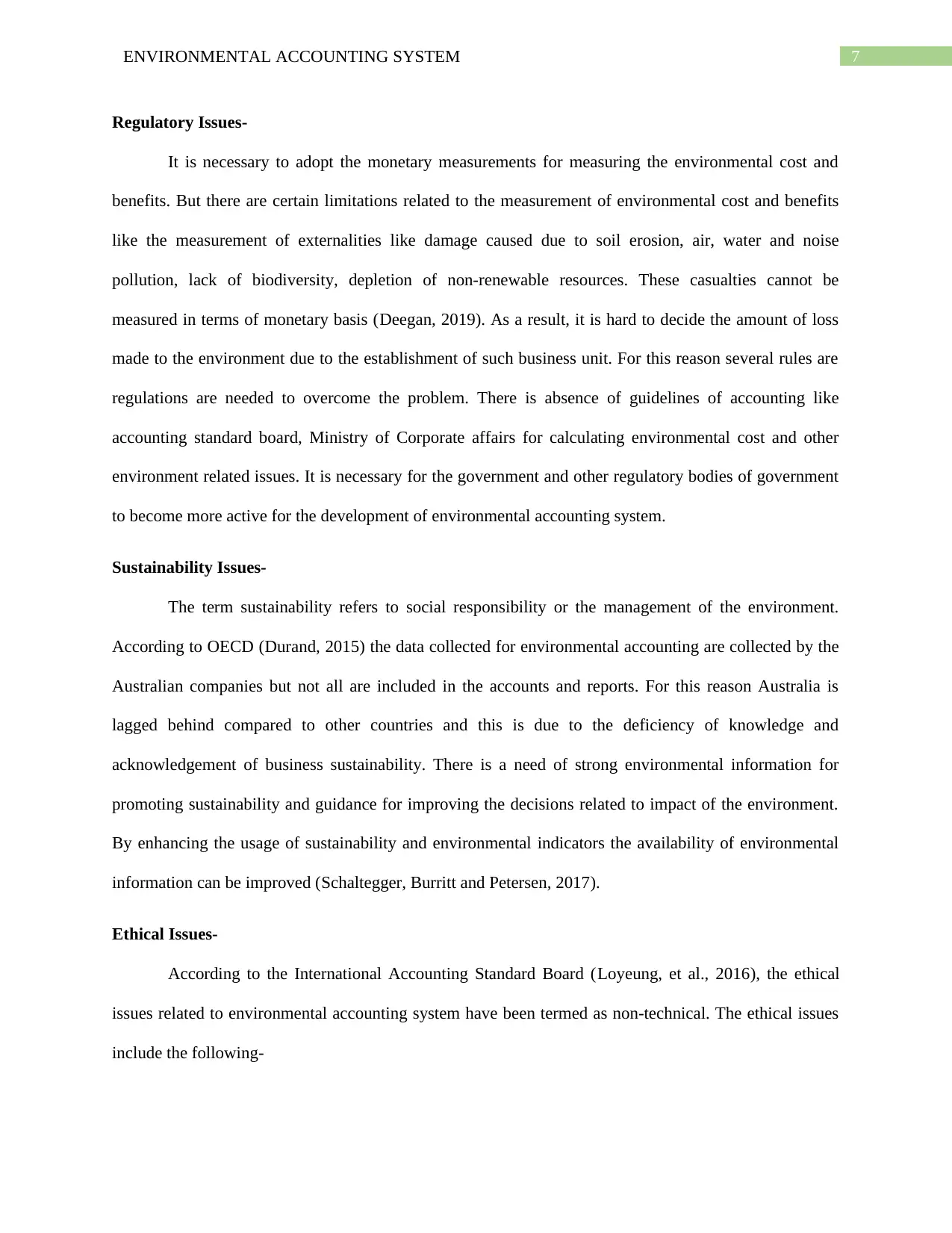
7ENVIRONMENTAL ACCOUNTING SYSTEM
Regulatory Issues-
It is necessary to adopt the monetary measurements for measuring the environmental cost and
benefits. But there are certain limitations related to the measurement of environmental cost and benefits
like the measurement of externalities like damage caused due to soil erosion, air, water and noise
pollution, lack of biodiversity, depletion of non-renewable resources. These casualties cannot be
measured in terms of monetary basis (Deegan, 2019). As a result, it is hard to decide the amount of loss
made to the environment due to the establishment of such business unit. For this reason several rules are
regulations are needed to overcome the problem. There is absence of guidelines of accounting like
accounting standard board, Ministry of Corporate affairs for calculating environmental cost and other
environment related issues. It is necessary for the government and other regulatory bodies of government
to become more active for the development of environmental accounting system.
Sustainability Issues-
The term sustainability refers to social responsibility or the management of the environment.
According to OECD (Durand, 2015) the data collected for environmental accounting are collected by the
Australian companies but not all are included in the accounts and reports. For this reason Australia is
lagged behind compared to other countries and this is due to the deficiency of knowledge and
acknowledgement of business sustainability. There is a need of strong environmental information for
promoting sustainability and guidance for improving the decisions related to impact of the environment.
By enhancing the usage of sustainability and environmental indicators the availability of environmental
information can be improved (Schaltegger, Burritt and Petersen, 2017).
Ethical Issues-
According to the International Accounting Standard Board (Loyeung, et al., 2016), the ethical
issues related to environmental accounting system have been termed as non-technical. The ethical issues
include the following-
Regulatory Issues-
It is necessary to adopt the monetary measurements for measuring the environmental cost and
benefits. But there are certain limitations related to the measurement of environmental cost and benefits
like the measurement of externalities like damage caused due to soil erosion, air, water and noise
pollution, lack of biodiversity, depletion of non-renewable resources. These casualties cannot be
measured in terms of monetary basis (Deegan, 2019). As a result, it is hard to decide the amount of loss
made to the environment due to the establishment of such business unit. For this reason several rules are
regulations are needed to overcome the problem. There is absence of guidelines of accounting like
accounting standard board, Ministry of Corporate affairs for calculating environmental cost and other
environment related issues. It is necessary for the government and other regulatory bodies of government
to become more active for the development of environmental accounting system.
Sustainability Issues-
The term sustainability refers to social responsibility or the management of the environment.
According to OECD (Durand, 2015) the data collected for environmental accounting are collected by the
Australian companies but not all are included in the accounts and reports. For this reason Australia is
lagged behind compared to other countries and this is due to the deficiency of knowledge and
acknowledgement of business sustainability. There is a need of strong environmental information for
promoting sustainability and guidance for improving the decisions related to impact of the environment.
By enhancing the usage of sustainability and environmental indicators the availability of environmental
information can be improved (Schaltegger, Burritt and Petersen, 2017).
Ethical Issues-
According to the International Accounting Standard Board (Loyeung, et al., 2016), the ethical
issues related to environmental accounting system have been termed as non-technical. The ethical issues
include the following-
Paraphrase This Document
Need a fresh take? Get an instant paraphrase of this document with our AI Paraphraser
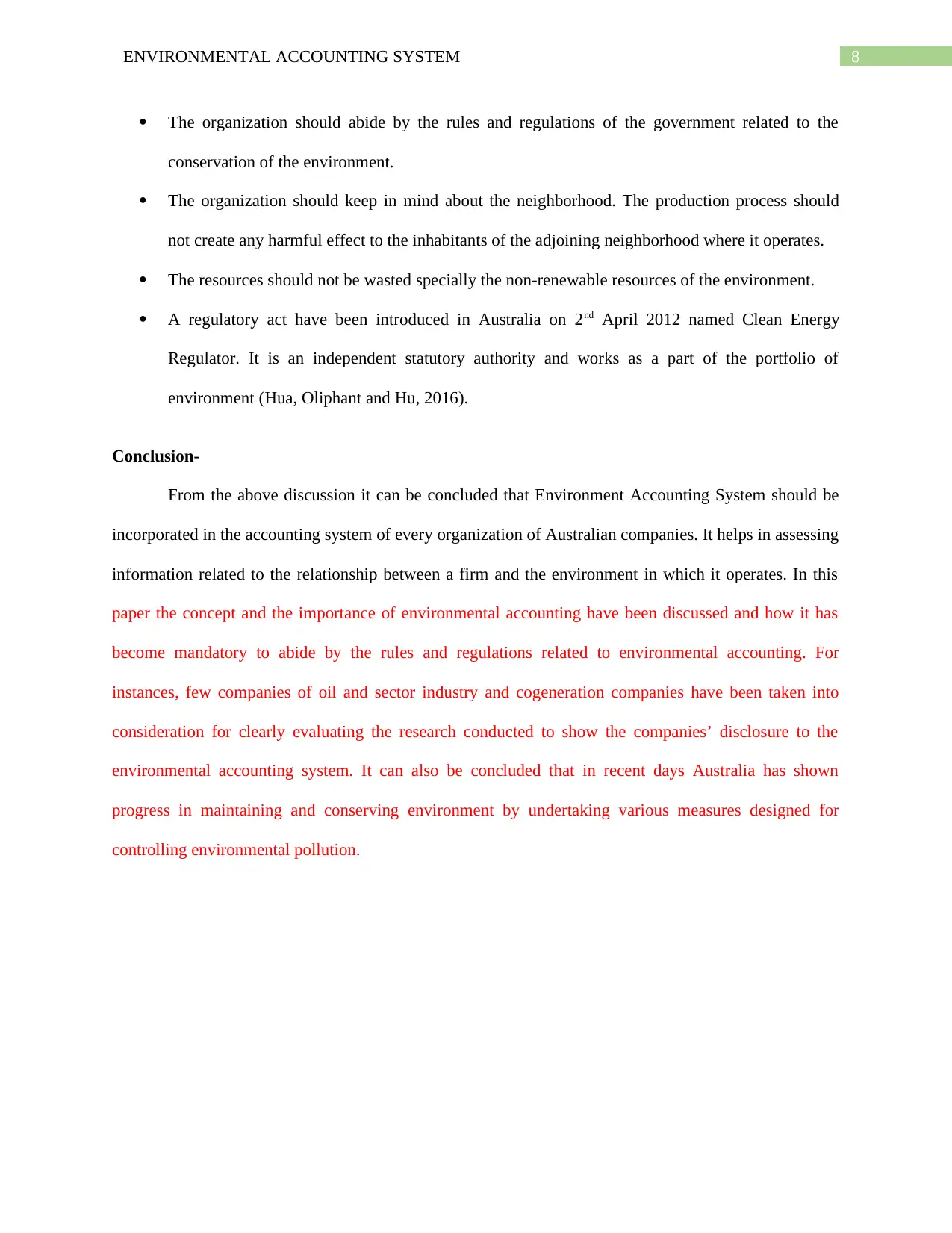
8ENVIRONMENTAL ACCOUNTING SYSTEM
The organization should abide by the rules and regulations of the government related to the
conservation of the environment.
The organization should keep in mind about the neighborhood. The production process should
not create any harmful effect to the inhabitants of the adjoining neighborhood where it operates.
The resources should not be wasted specially the non-renewable resources of the environment.
A regulatory act have been introduced in Australia on 2nd April 2012 named Clean Energy
Regulator. It is an independent statutory authority and works as a part of the portfolio of
environment (Hua, Oliphant and Hu, 2016).
Conclusion-
From the above discussion it can be concluded that Environment Accounting System should be
incorporated in the accounting system of every organization of Australian companies. It helps in assessing
information related to the relationship between a firm and the environment in which it operates. In this
paper the concept and the importance of environmental accounting have been discussed and how it has
become mandatory to abide by the rules and regulations related to environmental accounting. For
instances, few companies of oil and sector industry and cogeneration companies have been taken into
consideration for clearly evaluating the research conducted to show the companies’ disclosure to the
environmental accounting system. It can also be concluded that in recent days Australia has shown
progress in maintaining and conserving environment by undertaking various measures designed for
controlling environmental pollution.
The organization should abide by the rules and regulations of the government related to the
conservation of the environment.
The organization should keep in mind about the neighborhood. The production process should
not create any harmful effect to the inhabitants of the adjoining neighborhood where it operates.
The resources should not be wasted specially the non-renewable resources of the environment.
A regulatory act have been introduced in Australia on 2nd April 2012 named Clean Energy
Regulator. It is an independent statutory authority and works as a part of the portfolio of
environment (Hua, Oliphant and Hu, 2016).
Conclusion-
From the above discussion it can be concluded that Environment Accounting System should be
incorporated in the accounting system of every organization of Australian companies. It helps in assessing
information related to the relationship between a firm and the environment in which it operates. In this
paper the concept and the importance of environmental accounting have been discussed and how it has
become mandatory to abide by the rules and regulations related to environmental accounting. For
instances, few companies of oil and sector industry and cogeneration companies have been taken into
consideration for clearly evaluating the research conducted to show the companies’ disclosure to the
environmental accounting system. It can also be concluded that in recent days Australia has shown
progress in maintaining and conserving environment by undertaking various measures designed for
controlling environmental pollution.
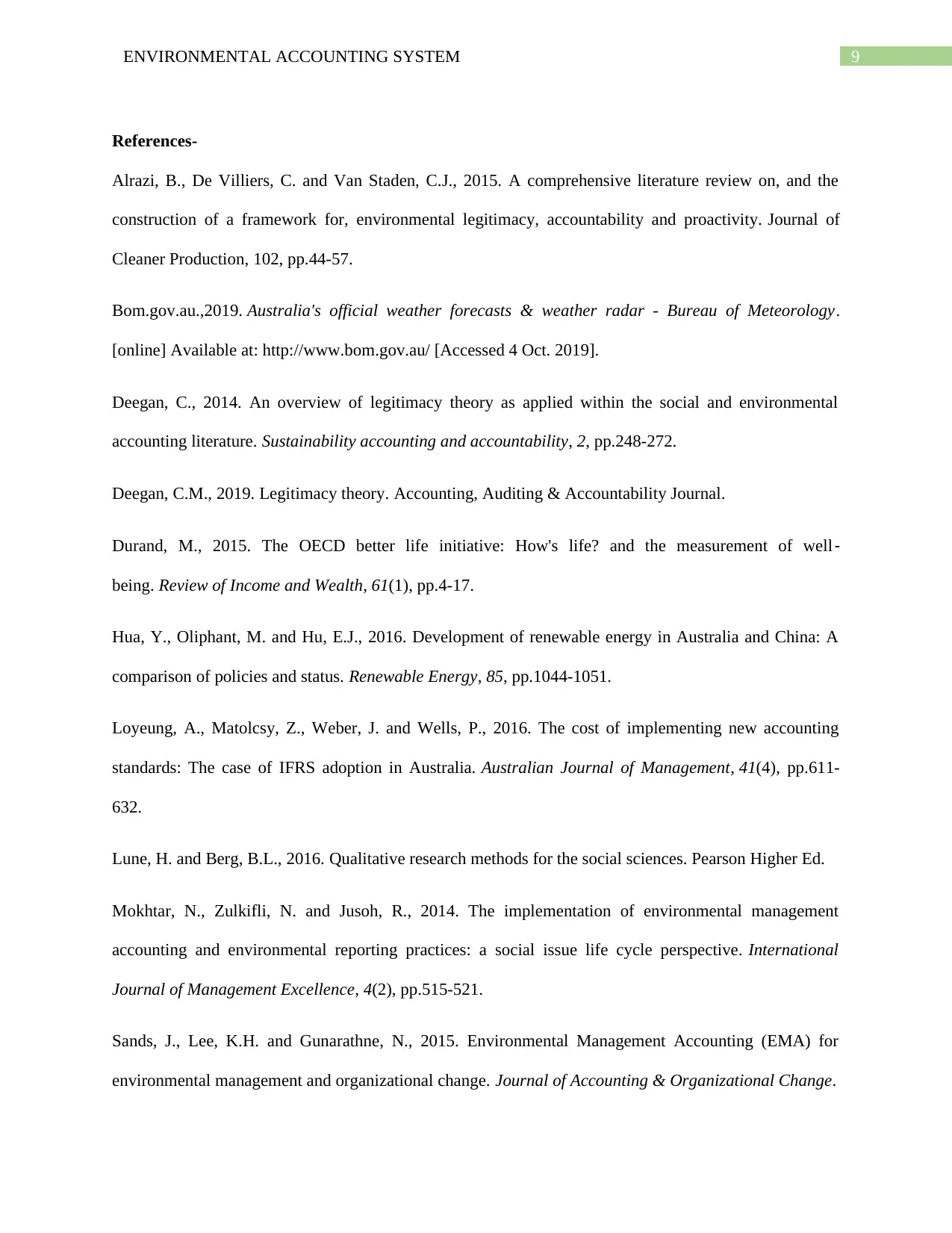
9ENVIRONMENTAL ACCOUNTING SYSTEM
References-
Alrazi, B., De Villiers, C. and Van Staden, C.J., 2015. A comprehensive literature review on, and the
construction of a framework for, environmental legitimacy, accountability and proactivity. Journal of
Cleaner Production, 102, pp.44-57.
Bom.gov.au.,2019. Australia's official weather forecasts & weather radar - Bureau of Meteorology.
[online] Available at: http://www.bom.gov.au/ [Accessed 4 Oct. 2019].
Deegan, C., 2014. An overview of legitimacy theory as applied within the social and environmental
accounting literature. Sustainability accounting and accountability, 2, pp.248-272.
Deegan, C.M., 2019. Legitimacy theory. Accounting, Auditing & Accountability Journal.
Durand, M., 2015. The OECD better life initiative: How's life? and the measurement of well ‐
being. Review of Income and Wealth, 61(1), pp.4-17.
Hua, Y., Oliphant, M. and Hu, E.J., 2016. Development of renewable energy in Australia and China: A
comparison of policies and status. Renewable Energy, 85, pp.1044-1051.
Loyeung, A., Matolcsy, Z., Weber, J. and Wells, P., 2016. The cost of implementing new accounting
standards: The case of IFRS adoption in Australia. Australian Journal of Management, 41(4), pp.611-
632.
Lune, H. and Berg, B.L., 2016. Qualitative research methods for the social sciences. Pearson Higher Ed.
Mokhtar, N., Zulkifli, N. and Jusoh, R., 2014. The implementation of environmental management
accounting and environmental reporting practices: a social issue life cycle perspective. International
Journal of Management Excellence, 4(2), pp.515-521.
Sands, J., Lee, K.H. and Gunarathne, N., 2015. Environmental Management Accounting (EMA) for
environmental management and organizational change. Journal of Accounting & Organizational Change.
References-
Alrazi, B., De Villiers, C. and Van Staden, C.J., 2015. A comprehensive literature review on, and the
construction of a framework for, environmental legitimacy, accountability and proactivity. Journal of
Cleaner Production, 102, pp.44-57.
Bom.gov.au.,2019. Australia's official weather forecasts & weather radar - Bureau of Meteorology.
[online] Available at: http://www.bom.gov.au/ [Accessed 4 Oct. 2019].
Deegan, C., 2014. An overview of legitimacy theory as applied within the social and environmental
accounting literature. Sustainability accounting and accountability, 2, pp.248-272.
Deegan, C.M., 2019. Legitimacy theory. Accounting, Auditing & Accountability Journal.
Durand, M., 2015. The OECD better life initiative: How's life? and the measurement of well ‐
being. Review of Income and Wealth, 61(1), pp.4-17.
Hua, Y., Oliphant, M. and Hu, E.J., 2016. Development of renewable energy in Australia and China: A
comparison of policies and status. Renewable Energy, 85, pp.1044-1051.
Loyeung, A., Matolcsy, Z., Weber, J. and Wells, P., 2016. The cost of implementing new accounting
standards: The case of IFRS adoption in Australia. Australian Journal of Management, 41(4), pp.611-
632.
Lune, H. and Berg, B.L., 2016. Qualitative research methods for the social sciences. Pearson Higher Ed.
Mokhtar, N., Zulkifli, N. and Jusoh, R., 2014. The implementation of environmental management
accounting and environmental reporting practices: a social issue life cycle perspective. International
Journal of Management Excellence, 4(2), pp.515-521.
Sands, J., Lee, K.H. and Gunarathne, N., 2015. Environmental Management Accounting (EMA) for
environmental management and organizational change. Journal of Accounting & Organizational Change.
⊘ This is a preview!⊘
Do you want full access?
Subscribe today to unlock all pages.

Trusted by 1+ million students worldwide

10ENVIRONMENTAL ACCOUNTING SYSTEM
Schaltegger, S., Burritt, R. and Petersen, H., 2017. An introduction to corporate environmental
management: Striving for sustainability. Routledge.
Taylor, M., 2014. Global warming and climate change: what Australia knew and. by ANU Press.
Schaltegger, S., Burritt, R. and Petersen, H., 2017. An introduction to corporate environmental
management: Striving for sustainability. Routledge.
Taylor, M., 2014. Global warming and climate change: what Australia knew and. by ANU Press.
1 out of 10
Related Documents
Your All-in-One AI-Powered Toolkit for Academic Success.
+13062052269
info@desklib.com
Available 24*7 on WhatsApp / Email
![[object Object]](/_next/static/media/star-bottom.7253800d.svg)
Unlock your academic potential
Copyright © 2020–2026 A2Z Services. All Rights Reserved. Developed and managed by ZUCOL.





